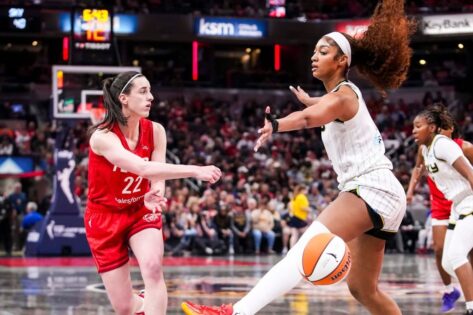

The WNBA's early focus on the perceived rivalry between Caitlin Clark and Angel Reese, while undeniably driving viewership and revenue, is arguably creating unintended challenges for the Indiana Fever. A national reporter's recent bold confession highlights how the league's narrative might be inadvertently hindering Clark's team and potentially overshadowing other deserving players and storylines.
The Clark-Reese dynamic, which originated during their college days, has been heavily promoted by the WNBA. Their first head-to-head matchup of the 2025 season drew record-breaking viewership for ESPN, with an average of 2.7 million viewers and a peak of 3.1 million. This game also marked a staggering 115% increase in viewership from the previous year's regular-season average. The league is capitalizing on this interest, with six WNBA teams moving to larger venues when the Fever come to town and a significant portion of Fever games being nationally broadcasted or streamed. While this increased exposure benefits the league as a whole, it also places immense pressure and scrutiny on Clark and the Fever.
One of the key issues is the heightened expectations placed on Clark to perform exceptionally well in every game. As the centerpiece of this media blitz, any struggles or losses faced by the Fever are immediately magnified and attributed to Clark's performance. This creates an environment where the team's overall development and progress can be overshadowed by individual scrutiny. After the Fever's first loss of the season to the Atlanta Dream, despite Clark's impressive 27 points and 11 assists, the focus remained on the defeat rather than the team's potential for growth.
Another challenge stems from the increased physicality and defensive intensity that Clark and the Fever face from their opponents. Fever coach Stephanie White noted that other teams are approaching their games against Indiana with a heightened level of physicality, and Clark herself acknowledged the need for the team to adapt to these strategies. While physicality is a part of basketball, the constant focus on Clark as a target can disrupt the Fever's offensive flow and create frustration. This was evident in their game against the Dream, where questionable officiating and missed calls further compounded the issue. Clark, known for not holding back, criticized the WNBA officials after the loss, pointing out the excessive time spent on challenges and the impact on the game's flow.
Furthermore, the constant emphasis on the Clark-Reese rivalry risks overshadowing the contributions and achievements of other WNBA players. While the rivalry has undoubtedly drawn new fans to the league, it's essential to acknowledge the talent and hard work of other athletes who deserve recognition. As one analyst noted, the media and money seem hyper-focused on Clark, which could inadvertently diminish the spotlight on other deserving players and storylines. Angel Reese, despite having an impressive rookie season where she averaged 13.6 points and a league-leading 13.1 rebounds, has been largely framed in the context of her rivalry with Clark.
Moreover, the league is currently investigating alleged racial comments made by fans during the Fever-Sky game directed at Angel Reese. The WNBA has released statements condemning racism, hate, and discrimination in all forms, but this incident highlights the necessity of ensuring a safe and inclusive environment for all players. While Clark has stated that she didn't hear anything due to the noise, she supports the investigation and condemns the alleged comments. This situation underscores the delicate balance the WNBA must strike between promoting rivalries and maintaining a respectful atmosphere.
Ultimately, while the WNBA's focus on Caitlin Clark and Angel Reese has been a boon for viewership and revenue, it's crucial for the league to ensure that this narrative doesn't inadvertently disadvantage the Indiana Fever or overshadow other deserving players. Balancing the promotion of individual rivalries with the celebration of the league's overall talent and values will be key to the WNBA's long-term success.